Triangles Class 9 MCQ with Answers – Maths Class 9 MCQ Online Test are covered in this Article. Triangles Class 9 MCQ Test contains 24 questions. Answers to MCQ on Triangles Class 9 MCQ are available after clicking on the answer. MCQ Questions for Class 9 with Answers have been made for Class 9 students to help check the concept you have learnt from detailed classroom sessions and application of your knowledge.
| Board | CBSE |
| Textbook | Maths (NCERT) |
| Class | Class 9 |
| Chapter | Chapter 7 Triangles |
| Category | MCQ Questions for Class 9 Maths with Answers |
Triangles Class 9 MCQ with Answers
1. Two figures are congruent, if they are of the
(a) same shape and different size
(b) same shape and same size
(c) different shape and different size
(d) different shape and same size
Answer
Answer: (b) same shape and same size
2. Two triangles are congruent if two sides and the included angle of one triangle are equal to the two sides and the included angle of the other triangle, this rule is called
(a) SAS congruence rule
(b) AAA congruence rule
(c) SAA congruence rule
(d) SSS congruence rule
Answer
Answer: (a) SAS congruence rule
Explanation: Two triangles are congruent if two sides and the included angle of one triangle are equal to the two sides and the included angle of the other triangle, this rule is called SAS congruence rule.
3. If two sides AC and BC of a triangle ABC are equal, and ∠C = 80°, then ∠B =
(a) 100°
(b) 40°
(c) 50°
(d) 80°
Answer
Answer: (c) 50°
Explanation: AC = BC
So, ∠A = ∠B [angles opposite to equal sides are equal]
Now, ∠A + ∠B + ∠C = 180° [angle sum property]
∠A + ∠B +80° = 180°
∠A + ∠B =100°
2∠B = 100°
∠B =50°
4. ABCD is square whose diagonals bisect each other at point O, then

(a) ∠ACO<∠ DCO
(b) ∠ACO =∠DCO
(c) ∠ACO∠DCO
(d)∠ACO∠DCO
Answer
Answer: (b) ∠ACO =∠DCO
Explanation: In triangle AOC and COD
∠AOC = ∠COD = 90° [Diagonals of a square bisect each other at 90°]
AC = DC [All sides of a square are equal]
OC = OC [Common]
△AOC ≅△COD [RHS Congruence Rule]
∠ACO =∠DCO [corresponding parts of congruent triangles]
5. Angles opposite to equal sides of an isosceles triangle are
(a) equal
(b) unequal
(c) greater than the third angle
(d) None of these
Answer
Answer: (a) equal
6. Lines l, m and n are parallel to each other and intersected by lines p and q which are also parallel to each other, then
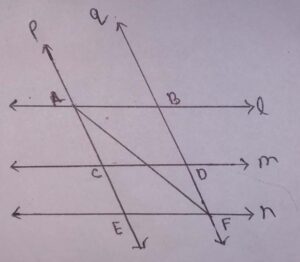
(a) AE > BF
(b) AE = BF
(c) BF > AE
(d) AE ≠ BF
Answer
Answer: (b) AE = BF
Explanation: In △AEF and △ABF
AF = AF [common]
∠AFE = ∠BAF [alternate interior angle]
∠EAF =∠AFB [alternate interior angle]
△AEF ≅ △ABF [ASA Congruence rule]
AE = BF [corresponding parts of congruent triangles]
7. Line A is the bisector of an angle ∠ P and O is any point on A. OQ and OR are perpendiculars from O to the arms of ∠ P, then
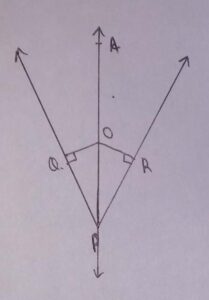
(a) O is equidistant from the arms of ∠P
(b) O is not equidistant from the arms of ∠P
(c) O’s distance from PQ is greater than PR
(d) O’s distance from PR is greater than PQ
Answer
Answer: (a) O is equidistant from the arms of ∠P
Explanation: In △POQ and △POR
OP = OP [common]
∠OQP = ∠ORP = 90° [OQ and OR are perpendiculars from O]
∠OPQ = ∠OPR [Line A is the bisector of an angle ∠ P]
△POQ ≅ △POR [RHS Congruence Rule]
OQ = OR [ CPCT]
So, we can conclude that O is equidistant from the arms of ∠P.
Triangles Class 9 MCQ with Answers
8.Two circles of the same radii are
(a) equal
(b) unequal
(c) congruent
(d) similar
Answer
Answer: (c) congruent
9. Each angle of an equilateral triangle is of
(a) 60°
(b) 70°
(c) 80°
(d) 90°
Answer
Answer: (a) 60°
Explanation:
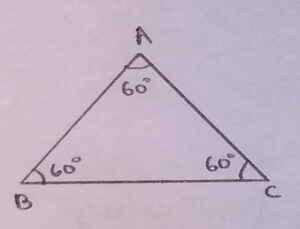
We know that in an equilateral triangle all sides are equal.
AB= BC = AC (All sides are equal)
Hence,
∠A = ∠B = ∠C (Opposite angles of equal sides)
∠A + ∠B + ∠C = 180° [angle sum property]
3∠A = 180°
∠A = 60°
So, ∠A = ∠B = ∠C = 60°
10. In triangle LMN, LM = LN and ∠M = 55° and L = 70° then ∠N =
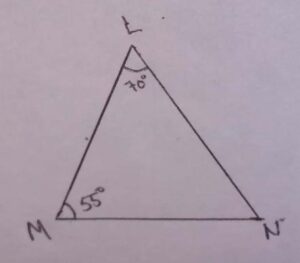
(a) 70°
(b) 75°
(c) 80°
(d) 55°
Answer
Answer: (d) 55°
Explanation: As LM = LN
We know that, angles opposite to equal sides are equal.
So, ∠M =∠N = 55°
11. ΔABC ≅ ΔQPR and AB = 5 cm, ∠B = 80° and ∠A = 60°. Then which of the following is true?
(а) QP = 5 cm, ∠R = 40°
(b) QR = 5 cm, ∠R = 60°
(c) PR= 5 cm, ∠R = 40°
(d) QP = 5 cm, ∠R = 60°
Answer
Answer: (а) QP = 5 cm, ∠R = 40°
Explanation:
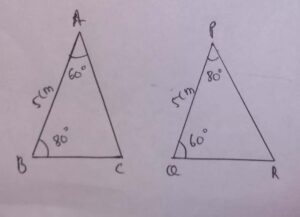
12.In ΔPQR, PQ = PR = 2cm and ∠QPR =60°, find value of x

(a) 60°
(b) 70°
(c) 80°
(d) 90°
Answer
Answer: (c) 80°
Explanation: As PQ = PR = 2cm
∠PQR = ∠PRQ [opposite angles to equal sides are always equal]
Now, ∠PQR + ∠PRQ +∠QPR = 180° [angle sum property]
x-20° + x-20° + 60° = 180°
2x =160°
x = 80°
13. In congruent triangles corresponding parts are
(a) unequal
(b) equal
(c) Can’t say anything
(d) None of these
Answer
Answer: (b) equal
14. Which of the following congruence rule is not correct?
(a) SAS rule
(b) ASA rule
(c) SSA rule
(d) SSS rule
Answer
Answer: (c) SSA rule
15. V and R are the mid points of the equal sides PQ and QS respectively and PR, QT and SV are angle bisectors of ∠P, ∠Q and ∠S respectively. Then
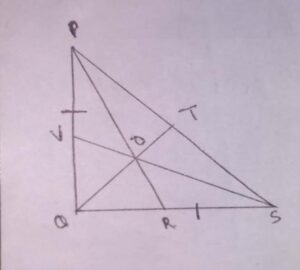
(a) O is the mid -point of PR
(b) O is not the mid- point of OR
(c) OP=OR
(d) (a) and (c) both
Answer
Answer: (d) (a) and (c) both
Explanation: In ΔPOV and ΔROS
VP = RS [Halves of equal sides]
∠VOP = ∠ROS [Vertically opposite angle]
∠VPO = ∠RSO [half of equal angles]
ΔPOV ≅ ΔROS
OP = OR [CPCT]
16. In ΔMON and ΔQOP, ON = OP, OM = OQ and ∠ MON = ∠POQ, then ΔMON is congruent to ΔQOP by
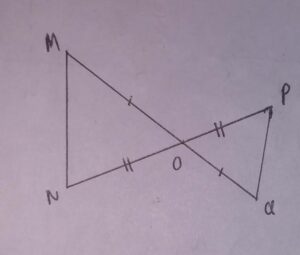
(a)SAS rule
(b)SSS rule
(c)RHS rule
(d)AAA rule
Answer
Answer: (a)SAS rule
Explanation: In ΔMON and ΔQOP
ON = OP
OM = OQ
and ∠MON = ∠POQ
So, two sides and angle between these two sides is equal, this satisfies the SAS rule.
Triangles Class 9 MCQ with Answers
17. In ΔABC and ΔPQR, ∠P = ∠A, ∠R = ∠B and AB = PR. Then ΔABC
(a) ΔPQR
(b) ΔPRQ
(c) ΔPBR
(d) ΔPRB
Answer
Answer: (b) ΔPRQ
Explanation: As all angles are equal so by ASA congruency rule ΔABC ≅ ΔPRQ
18. In RHS congruence rule H stands for
(a) Height
(b) Hypotenuse
(c) either height or hypotenuse
(d) Neither height and hypotenuse
Answer
Answer: (b) Hypotenuse
19. S is a point equidistant from two lines l and m intersecting at point P. Then ∠PSQ =
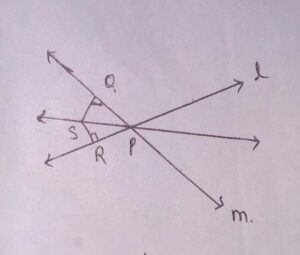
(a)∠PSR
(b) ∠PQS
(c) ∠PRS
(d) ∠SPQ
Answer
Answer: (a)∠PSR
Explanation: In ΔPQS and ΔPRS
∠SQP = ∠SRP = 90 [Given]
SP = SP [Common]
SQ = SR [S is a point equidistant from two lines l and m]
ΔPQS ≅ ΔPRS {By RHS congruency }
∠PSQ =∠PSR[CPCT]
20. A triangle whose two sides are equal is called
(a) Scalene triangle
(b) Isosceles triangle
(c) equilateral triangle
(d) None of these
Answer
Answer: (b) Isosceles triangle
21. In ∆ PQR, PS is the perpendicular bisector of QR. Then ∆ PQR is an

(a) Scalene triangle
(b) equilateral triangle
(c) Isosceles triangle
(d) None of these
Answer
Answer: (c) Isosceles triangle
Explanation: In ΔPQS and ΔPRS
PS = PS [ Common]
QS = SR [PS is the perpendicular bisector of PQ]
∠PSQ = ∠PSR = 90°
ΔPQS ≅ ΔPRS
PQ = PR [CPCT] which implies that ∆ PQR is an Isosceles triangle.
22. In two triangles ABC and DEF, AB = DE, BC = EF and AC = DF, then both triangles are congruent by
(a) AAA rule
(b) ASA rule
(c) SSS rule
(d) SAS rule
Answer
Answer: (c) SSS rule
23. Two triangles are congruent if any two pairs of angles and one pair of corresponding sides are equal. Then this congruency rule is
(a) ASA
(b) SSS
(c) SSA
(d) SAS
Answer
Answer: (a) ASA
24. In below figure, ΔDBA
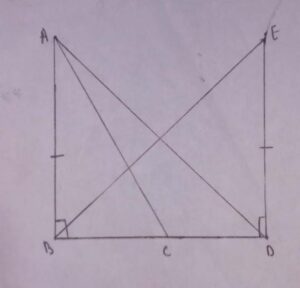
(a) ΔDBE
(b) ΔDEB
(c) ΔBDE
(d) None of these
Answer
Answer: (c) ΔBDE
Explanation: In ΔDBA and ΔBDE
BD = BD [common]
AB = DE [Given]
∠ABD = ∠BDE = 90°
So, By RHS congruency rule
ΔDBA ≅ ΔBDE
MCQ Questions for Class 9 Maths
- Number Systems Class 9 MCQ with Answers
- Polynomials Class 9 MCQ with Answers
- Coordinate Geometry Class 9 MCQ Questions
- Linear Equations in Two Variables Class 9 MCQ with Answers
- Lines and Angles Class 9 MCQ with Answers
- Triangles Class 9 MCQ with Answers
- Quadrilaterals Class 9 MCQ Questions
- Circles Class 9 MCQ with Answers
- Constructions Class 9 MCQ
- Heron’s Formula Class 9 MCQ with Answers
- Surface Area and Volume Class 9 MCQ
- Statistics Class 9 MCQ
- Probability Class 9 MCQ with Answers
Frequently Asked Questions on Triangles Class 9 MCQ with Answers
1. Are these MCQ on Triangles Class 9 MCQ are based on 2021-22 CBSE Syllabus?
Yes. There are 24 MCQ’s on this Chapter in this blog.
2. Are you giving all the chapters of Maths Class 9 MCQs with Answers which are given in CBSE syllabus for 2021-22 ?
Yes, we are providing all the chapters of Maths Class 9 MCQs with Answers.